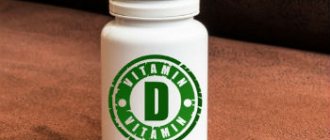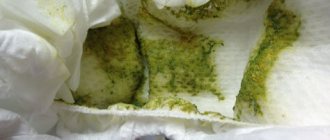Many parents have experienced poisoning in their child. This can be at a very early age, when children's curiosity drives them to try everything unfamiliar. Or maybe in older people, when the cause is poor-quality food, drinking, unwashed hands, etc. If you answer the question of whether children have a fever during poisoning, then the answer is unequivocal - it happens. The temperature in case of food poisoning in a child can reach 39 degrees, or may not be present at all. This depends on the type and volume of the pathogen that has entered the child’s body.
Principles of reducing fever in case of poisoning
In such situations, before taking antipyretics, you must first carry out some basic procedures. First of all, you need to rinse your stomach. To do this, you need to drink 2-3 liters of clean warm water (you can add a little salt or potassium permanganate to it), then lightly press the very root of the tongue with the tips of two fingers, which will activate vomiting and help cleanse the stomach of harmful toxins. For effectiveness, it is recommended to repeat this procedure several times, until the body is completely cleansed of intoxication.
After this, you should take some drug with absorbent properties. Artificial absorbents will help neutralize toxins, harmful microorganisms and excess gases in the intestines. The most famous absorbents include such drugs as:
- White/black coal,
- Enterosgel,
- Lactofiltrum,
- Smecta,
- Neosmectin,
- Polysorb,
- Polyphepan and others.
The role of dietary nutrition in rehabilitation after poisoning
In order for the patient’s body to recover faster after poisoning, dietary nutrition is prescribed. It is worth considering that in the acute phase of the disease, therapeutic fasting is indicated, which generally lasts 24 hours. Next, light food is introduced in small portions. Nutritionists recommend the food intake scheme given below.
- Baked apples. You can bake it with the addition of honey, as it is a source of electrolytes and nutrients.
- Ripe bananas. If the fruits are not too ripe, they are immersed in boiling water for a few seconds. This allows you to remove excess starch, which can add complications to an already weak stomach.
- Viscous porridge. Rice, buckwheat or oatmeal are boiled for a long time in large amounts of water. It turns out to be a messy diet porridge. You can use chopped cereal.
- The second broth is made from lean meats. Chicken breast, veal or lean pork will do.
- Liquid mashed potatoes.
- Boiled eggs.
A few days later, after the condition returns to normal, fermented milk products are included in the patient’s diet. Biokefir has a particularly good effect on the restoration of the gastric mucosa. It helps fill the stomach with beneficial microorganisms. If you are poisoned with a fever, you can take various probiotics that will speed up the recovery process.
When to start taking antipyretics?
Often, a high temperature can be brought down with the help of folk remedies, for example, compresses, however, if this does not help, it remains to take extreme measures in the form of antipyretic drugs, of which there are a huge variety on the modern market. The drugs that are recommended to reduce the temperature caused by intoxication of the body belong to the pharmacological group of NSAIDs (Nonsteroidal anti-inflammatory drugs) or NSAIDs (drugs). For pregnant women, drugs in this group are contraindicated.
The most famous NSAID is, of course, acetylsalicylic acid (aspirin). Nonsteroidal anti-inflammatory drugs also include: Upsarin, Paracetomol, Paralen, Artiflex, Milistan, Anap, Ibuprofen, Nurofen, Ibufen, Ibuprom, Ibunorm, etc.
Contraindications
In addition, before you start taking an antipyretic drug, you need to familiarize yourself with its contraindications. Among those for whom taking such medications is strictly prohibited or highly undesirable are patients suffering from:
- acute renal failure;
- bronchial, so-called “aspirin” asthma;
- liver dysfunction;
- heart failure;
- hypersensitivity to medications;
- ulcer;
- problems in the functioning of the hemostatic system;
- Crohn's disease;
- eye disease.
Possible side effects
It is worth remembering that during poisoning, the human body intensively fights against toxins, this is where most of its resources are currently devoted, so you should very carefully calculate the medication dose and in no case overdo it. If the dosage is exceeded, an excessive load (of chemicals) begins to be placed on the liver and other organs.
The most likely side effects may include:
- pain and heaviness in the intestinal area;
- migraine;
- dry mouth;
- anxiety;
- drowsiness;
- dyspnea;
- frequent urination;
- increased motor and mental activity;
- failure of the kidneys;
- narrowing of the bronchi;
- breathing problems;
- swelling;
- rash on the body;
- chronic hemorrhages and bleeding;
- constipation, etc.
If any of the listed or other side effects begin to occur while taking fever-reducing medications, it is recommended to immediately stop taking the drug.
Correct dosage
If your choice is Paracetomol (called Acetaminophen in Western countries), then this analgesic and antipyretic should be taken in a single dose of 200-500 mg. The frequency of administration is 2-3 times a day (every 4-5 hours), and the duration of treatment should be no more than 5-7 days. Especially for children, dosage forms such as 80 mg capsules and syrups are available. The maximum daily dose for children depends on the age (weight) of the child; an approximate scheme for calculating the correct dosage is 10-15 mg of the substance per 1 kg of body weight, i.e. if a child weighs 10 kg, then his daily dose of paracetomol is 100-150 mg.
Ibuprofen is also taken 2-3 times a day, at a rate of no more than 1200 mg per day and a treatment duration of no more than 3 days. This drug can also be taken by children over 6 years of age. An approximate dosage calculation is 5-10 mg per 1 kg of child weight.
How long does the temperature stay normal?
There is no such concept as a “normal temperature increase” during food and non-food intoxication. The speed of recovery is affected by the type of toxin and the type of microorganisms that caused the poisoning.
Prognosis for recovery after poisoning:
- diarrhea and vomiting were temporary in nature and did not recur after measures to cleanse the stomach. Within 6–24 hours the child’s condition returns to normal;
- if symptoms increase over the course of a day, signs of dehydration appear, treatment will be lengthy and may take up to 2 weeks;
- if signs of intoxication appeared suddenly and immediately subsided after first aid, the patient will recover within 2–3 days;
- if the temperature has risen to critical values - from 38.5 and above, signs of cardiac dysfunction have appeared, diarrhea and vomiting cannot be stopped with home methods, the child should be hospitalized. The duration of treatment is 7–10 days.
Causes of temperature
Why does a person have an increase in temperature during poisoning? Most often people suffer from poor quality food, food intoxication is the most common. However, overdoses of other substances can also lead to the development of an unpleasant symptom.
Body temperature is regulated by a region of the brain called the hypothalamus. In the absence of stimuli, thermoregulation can be influenced by the cerebral cortex. Its actions depend on the environment.
When intoxicated, harmful microorganisms release toxic substances and cause fever. During inflammation, the body also actively produces various compounds that affect thermoregulation.
A feverish state is a positive thing, in this way the body fights microorganisms, preventing them from multiplying. In what cases is it possible for a person to have an increase in temperature?
- Pathological processes in the intestines, microflora disturbances,
- Gastritis and other diseases of the stomach in the acute phase,
- Inflammation in the pancreas,
- Increased temperature provokes increased sweating - toxic substances are released along with sweat.
What happens in the body when a person develops a fever? In this condition, some changes are diagnosed.
- Acceleration of metabolism,
- Blood circulation is stimulated
- The movement of fluid in tissues is improved,
- Harmful microorganisms are destroyed
- Increased secretion leads to cleansing of the body from poisons.
However, it must be remembered that a prolonged increase in temperature has an adverse effect on humans. Therefore, the use of antipyretics is permissible.
Consequences of poisoning
What happens if you take too much Paracetamol? Unfortunately, in some situations, an overdose and the consequences can be sad.
Late medical care after departure can lead to the following complications.
- Acute renal failure.
- Encephalopathy. Associated with organic damage to the cerebral cortex. Severe swelling appears, which begins to develop over time.
- Coagulopathy. This complication is typical for people over 30-40 years old. Blood clotting is impaired, and pockets of internal bleeding are formed.
Doctors include the following manifestations as additional complications after poisoning:
You should be aware that you will have to spend a lot of time and effort on recovery. You may be prohibited from taking medications that contain certain substances.
Delayed treatment and advanced stage of the disease can lead to death from Paracetamol.
When temperature is dangerous
In what cases does the presence of fever pose a danger to the patient? Despite the fact that in this way the body fights harmful compounds, constant excess of the norm leads to serious complications and consequences. There are cases in which the presence of an upward change in normal indicators indicates a dangerous condition.
- Intense vomiting, inability to stop it,
- Severe diarrhea, blood and pus in the feces,
- Presence of signs of severe dehydration - pale and dry skin and mucous membranes, apathetic state,
- Disruption of the nervous system, manifested in convulsive manifestations, neuroses, problems with the respiratory system,
- Taking antipyretics does not give the desired result.
In all situations described, treatment is carried out after consultation with a medical professional.
In what cases is temperature dangerous?
Any food poisoning with fever requires immediate medical attention if:
- severe repeated vomiting develops;
- loose stools appear more than 10 times a day or mixed with blood;
- with severe dehydration;
- at the first signs of damage to the nervous system: muscle tremors, convulsions, changes in breathing, disturbances of consciousness, narrowing or dilation of the pupils;
- if after providing first aid measures the temperature remains high, is not brought down by medications or decreases for a short time.
Even with ordinary poisoning from spoiled foods, body temperature can rise to 40 °C. It is dangerous if it rises above 38.5 °C or lasts more than a day.
How to treat poisoning with fever
Poisoning with the presence of fever requires careful attention and mandatory compliance with all doctor’s prescriptions. Doctors do not recommend using antipyretic drugs at temperatures below thirty-eight degrees.
It is believed that these indicators in case of poisoning are natural for the body to fight toxic substances. Exceptions are cases when a person tolerates such increases very poorly - then the use of antipyretic drugs is acceptable.
In other cases, at temperatures below thirty-eight degrees, in case of poisoning, standard first aid and treatment are carried out.
What to do:
- The victim of poisoning undergoes gastric lavage with a large volume of clean water or a weak solution of potassium permanganate.
- After cleansing, you are given sorbents to speed up the removal of toxins from the body.
- If necessary, in case of poisoning, it is allowed to use mild laxatives or cleansing enemas.
- The victim is given plenty of fluids to drink to avoid dehydration.
When procedures are carried out correctly in case of poisoning, the patient’s condition is alleviated and the temperature drops on its own.
In more serious situations, it is recommended to contact a medical facility. The use of antipyretic drugs in case of poisoning is allowed only as prescribed by a specialist. Self-administration can lead to adverse consequences and aggravation of the condition.
First aid for overdose of Paracetamol
The first main rule in case of drug poisoning is to urgently contact a specialist, regardless of the stage.
While you are waiting for the ambulance to arrive, you can take the following measures yourself.
- Make a solution of salted or acidic water and rinse the victim’s stomach.
- After washing, offer the patient activated carbon or any other sorbent. This could be Ecoflor , Enterosgel , Polysorb .
Additionally, in case of overdose, you can make weak saline solutions, for example Magnesium Sulfate. The patient should drink plenty of water. But you should avoid tea, dairy products, mineral water and drinks. The main task at this stage, before the ambulance arrives, is to remove as many harmful substances from the body as possible.
Antidote
Doctors use the antidote for Paracetamol - Acetylcysteine . But it can counteract an overdose only if the patient manages to take it within 8 hours after poisoning. The action of Acetylcysteine is aimed at neutralizing toxins and protecting the liver from the effects of poisoning.
Acetylcysteine
Experts advise diluting the substance in sweet water or juice.
Methionine may be prescribed at the same time . The substances contained in this drug break down the substances of Paracetamol.
Methionine
The remedy is used as an auxiliary to the main one, when a strong toxic reaction occurs and the body is weakened. Along with Methionine, Cysteamine and Dimercaprol have a good effect in case of overdose. Available in capsules.
When is medical attention required?
Medical assistance is required at any stage of poisoning and a doctor should be called immediately after the first signs are detected.
Especially when it comes to overdose in children. It is better to observe them in a hospital setting.
While you are waiting for a specialist to arrive, you should try to cleanse your body at home.
Is it possible to take Paracetamol if poisoned? Until you have determined the true cause of the disorder, even if you have a high fever, it is not recommended to take this drug until your doctor approves this decision.
Antipyretics for poisoning: a review of medications
What medications with an antipyretic effect can be used for fever-related poisoning? The medical professional will select the drug based on the condition and characteristics of the affected person’s body.
- Paracetamol. A popular antipyretic drug, it is approved for use in adults and children from the third month of life. For adults in case of poisoning, the dosage is 500 mg. If necessary, repeat after a certain period of time, but not more than four times every twenty-four hours. In children, the amount of antipyretic medication depends on age. Analogues - Panadol, Rapidol. Has contraindications.
- Ibuprofen. Reduces temperature and relieves pain. The allowed amount for poisoning is calculated individually for each patient. In adults, up to 800 mg four times a day is acceptable. In children, the dosage is determined depending on weight - up to 40 mg per kilogram. The total quantity is divided into several doses. Analogues - Ibufen, Nurofen.
- Nimesulide. Acceptable for use in adults. Dosage in tablets - one piece up to two times a day, in suspension - one sachet twice every twenty-four hours.
- Nise. A potent antipyretic agent with nimesulide base. Allowed for use in children from two years of age. In children, suspensions are used to relieve fever in case of poisoning; adults are prescribed a tablet form.
- Aspirin. The drug is used in extreme cases when there is no effect from previously used drugs. For an adult, the permissible dosage for one use is 1000 mg. It is allowed to take antipyretic medicine every four hours, the interval can be increased. In case of poisoning in children, the drug is used in rare cases due to possible serious complications.
Nutrition
All children, without exception, after the vomiting disappears, are transferred to proper nutrition after poisoning. For babies who eat food on their own, the diet is sharply reduced, excluding several feedings. Older children are offered food only after the vomiting has stopped.
Dietary food should be gentle on the digestive system. The list of acceptable products should include healthy foods that help restore the gastrointestinal tract.
Complementary foods are replaced with pureed rice or buckwheat porridge cooked in water. After two days, the introduction of vegetable purees is allowed. After three or four days, they return to dairy products (cottage cheese). Typically, food poisoning goes away in 3-4 days; on days 5-6, meat or fish soufflé is introduced into the diet.
To restore the microflora in the intestines, children after one year can be offered Bio kefir. Soups, cereals, meat and fish dishes are offered in crushed form, ground to a fine fraction.
Since poisoning is accompanied by vomiting, the child loses a lot of water, therefore, in order to prevent dehydration, the water-salt balance should be restored, tea, rosehip decoction, and dried fruit compote should be offered more often.
A high temperature in case of poisoning in a child does not contribute to a good appetite; if the baby refuses to eat, there is no need to insist, but the drinking regime must be observed, and the drinks themselves can be rich and healthy.
Products that have a laxative effect and lead to flatulence are not allowed in the diet. Baked goods and sweet products should be excluded. Since poisoning may vary in course and clinical picture, the diet can also be strict with therapeutic fasting or relaxed. When choosing a diet, the doctor takes into account the general condition of the child.
The first products offered after vomiting are completed are crackers, oatmeal, rice porridge, mashed potatoes, and white bread crackers. The first meals should be frequent, in small portions.
It is prohibited to offer your child chips, ice cream, chocolate, pasta, bread and rolls.
It is recommended to maintain the duration of the diet for two weeks, since the digestive tract requires time to recover, after which the diet gradually returns to normal.
When a child is poisoned, the temperature rises due to severe intoxication of the body. This symptom is alarming and indicates the need for treatment. This article discusses in detail the causes of fever in children with food poisoning and the main methods of its normalization.
Diet for fever
Proper nutrition plays a serious role in case of food poisoning. Fasting is indicated on the first day after poisoning. This will help relieve irritation and inflammation in the digestive system. On the second day after poisoning, it is allowed to eat low-fat food, preferably in a semi-liquid state.
❗❗❗Fried, fatty, spicy foods, baked goods, and sweets are excluded from the diet. It is better to steam or bake with a minimum amount of oil. The consumption of sugar and salt needs to be reduced.
Preference is given to low-fat soups and fermented milk products. It is allowed to eat boiled eggs, liquid mashed potatoes, and various cereals in a viscous state. Instead of coffee and cocoa, it is better to drink green tea, rosehip infusion, and mineral water.
Diagnostics
The diagnosis of food poisoning is made by a pediatrician or infectious disease specialist after studying the anamnesis, complaints and clinical picture. They also pay attention to epidemiological data, the presence of group cases when eating the same food in the region.
Information about infection is obtained from biological fluids (vomit, feces).
If a generalized infection is suspected, blood is taken for bacterial culture.
For express diagnostics, tests are used: immunofluorescence (RIF), enzyme-linked immunosorbent assay (ELISA), polymerase chain reaction (PCR) - they are also important.
Sometimes, to establish an accurate diagnosis, the participation of additional specialists (neurologist, gastroenterologist, surgeon) is required.
Treatment of poisoning with fever in a child
In children, poisoning is more intense than in adults. Elevated temperature in such situations is not uncommon. The use of antipyretics in children has certain features.
- The child's stomach is washed to remove toxins,
- After cleansing, it is recommended to take sorbents,
- If a child is poisoned, they are given a lot to drink to avoid dehydration.
- In case of fever, wipe the body with a cloth soaked in water at room temperature,
- Enemas are used to cleanse the intestines,
- The use of medications is permitted only after consultation with a specialist in order to avoid an overdose of antipyretics.
In young children, it is better to give preference to rectal suppositories; for adolescents, it is permissible to give tablets. Be sure to monitor the child's condition. Can there be an overdose? If used incorrectly, a similar phenomenon may develop.
Features of the child's body
Food poisoning in young patients is much more severe than in adults, due to the immaturity of the child’s immune system, in particular:
- Low pH of gastric juice. Normal acidity can build a barrier against the action of toxins and other pathogenic microorganisms.
- Defective liver function. The inability of the organ to bind and remove poisons from the body, due to an incompletely formed enzymatic system.
- Kidneys have low filtration capacity.
- Many children are diagnosed with dysbiosis after birth, which indicates a lack of complete intestinal protection by normal microflora.
From the above, we can conclude that children are more prone to food poisoning, which, if not treated promptly, develops in severe forms. That is why, when the first signs of poisoning with fever are detected in a child, it is necessary to carry out desintoxication measures and seek help from a pediatrician.
Anna:
There were often problems with the intestines, any food led to poisoning. I tried a lot of things, but there was no result.
I decided to try the teas. The monastery collection of Father George began to help me well.
Symptoms of an antipyretic overdose in a child appear after some time. The baby becomes lethargic and apathetic. There is an increase in unpleasant symptoms. Possible vomiting, nausea, severe diarrhea.
In severe cases, disturbance of the respiratory process, convulsive manifestations, blanching of the upper layer of the epidermis. Self-medication in such situations is prohibited; an overdose of antipyretics in a child is treated in a medical facility.
When to see a doctor
In most cases, parents cope with food poisoning in a child on their own without going to a medical facility.
There are a number of situations when seeing a doctor is the only way to improve the baby’s condition:
- Long-term diarrhea - more than 10 episodes during the day.
- The appearance of any suspicious inclusions in the stool - blood, mucus, pieces of food, change in color of the stool.
- Critical temperatures have been observed for more than a day.
- Uncontrollable vomiting – the condition quickly leads to dehydration. This is dangerous for small children.
- The appearance of signs of lack of fluid - crying without tears, lack of urination for 6 hours, dry lips, mucous membranes, and skin.
- The appearance of the smell of acetone from the skin, when breathing.
- Loss of consciousness, disturbance of higher nervous functions, the appearance of convulsions.
- The appearance of a rash, stiffness of the neck muscles.
- Constriction of the pupil.
It takes a long time to get rid of the consequences of intoxication. You can speed up the recovery process by following the doctor’s recommendations and not trying to self-medicate in cases where hospitalization is the only way to help the baby.
source
Disease prevention
Poisoning is an unpleasant phenomenon. It can be avoided by maintaining the right lifestyle. You need to be careful with food, follow cooking techniques, and monitor shelf life. The use of chemicals is carried out in personal protective equipment.
Antipyretic drugs for poisoning are prescribed by doctors in serious cases. It is not recommended to use such remedies on your own to avoid adverse consequences and complications.
How to avoid complications
To prevent intoxication and fever, you must:
- use personal protective equipment when in contact with gases and chemicals (masks, respirators, gloves);
- stop eating spoiled foods;
- strictly observe the temperature regime and expiration dates of products;
- do not collect or eat unfamiliar berries, plants and mushrooms;
- wash your hands before eating;
- comply with sanitary and hygienic rules;
- calculate the dosage when taking medications;
- Avoid contact with chemicals.
Prevention of botulism includes careful heat treatment of foods before canning and avoiding eating pickles from jars with bulging lids.
Causes of high fever due to food poisoning
Food poisoning in adults and children is often accompanied by an increase in temperature, which appears as a protective reaction of the body to intoxication caused by the action of pathogenic microorganisms.
With hyperthermia, metabolic processes accelerate, sweating increases, toxins are eliminated faster, and the production of interferon and antibodies is activated.
The causes of hyperthermia are inflammation in various organs:
- intestines - imbalance of intestinal microflora (beneficial microflora is suppressed);
- stomach - irritated mucous membrane causes severe pain and fever;
- pancreas - first manifestations: increased body temperature, severe pain.
The patient experiences severe chills, muscle pain, weakness, fatigue, and increased sweating. Poisoning is often accompanied by nausea and vomiting, as the body tries to get rid of toxic substances in the stomach.
If the temperature continues to remain high for a long time, severe complications may develop:
- disruption of brain activity (accompanied by lethargy, loss of consciousness);
- damage to the nervous system (development of seizures);
- kidney problems (as a result of dehydration, protein in the urine, creatinine and urea appear);
- drop in blood pressure;
- blood thickening.
Signs of an overdose of Paracetamol
How to understand that an overdose has occurred and begin to act urgently? Experts identify several stages that intoxication goes through.
Stage I
2 hours after drinking a Paracetamol tablet or syrup, acute signs of malaise begin. They continue for 18-24 hours after overdose and poisoning. The patient experiences occasional or constant vomiting, weakness, and a throbbing headache.
When the temperature drops, the skin turns white. Beads of sweat appear on the face, neck and chest. The impact is progressing.
Most often, such symptoms are not paid attention to, as they are associated with the manifestation of colds, viral and infectious diseases. However, if such signs are detected, absorbents must be used.
Stage II
Gradually, decay products fill the liver. At the same time, the process of their removal from the body slows down.
After a day, signs of nausea may decrease, and the patient feels much better. But there remains a nagging pain under the right rib, which turns into spasm and other symptoms. Shoots are felt in the side or back. The pain intensifies with physical activity and movement.
At this stage, you can still help the body by taking absorbents.
Stage III
Three days after poisoning, other acute symptoms begin to develop rapidly.
- No appetite.
- The whites of the eyes turn yellow and the eyes water.
- The skin becomes yellow.
- A heart rhythm disturbance is detected.
- Swelling on the face, limbs, abdomen and neck.
- Toxic vomiting manifests itself with renewed vigor.
- Orientation in space is lost.
- The patient suffers from hallucinations.
At the same time, the pain in the liver area begins to intensify and becomes unbearable. On palpation, you can observe a compaction in the hypochondrium on the right. And some patients notice bleeding from the gums or nose. This is associated with increased blood pressure.
If at this stage a person does not seek qualified medical help, then the toxins that continue to be in the body will begin to affect the nervous system and cerebral cortex, which will worsen the poisoning.
The consequence of this will be delirium, medically induced coma and other symptoms.
Features of treatment in a child
When a child has a fever due to food poisoning, this poses a greater danger (unlike adult patients). To determine the cause, you need to see a doctor.
Poisoning in children can quickly lead to dehydration, so qualified medical attention is required.
When treating food poisoning in a child, follow the following rules:
- Do not reduce the temperature if the parameter is not higher than 38.5 °C. Does not apply to children suffering from chronic pathologies or convulsions, when signs of deterioration in health appear (pallor of the skin, severe chills, muscle and joint pain).
- To reduce the temperature, rub the limbs, chest, neck, and face.
- If you are taking medications, you must agree on the dose with your doctor (the reaction of an organism weakened by toxins to antipyretics may be different). For children under 3 years of age, it is recommended to use rectal suppositories Ibuprofen and Paracetamol to reduce fever: suppositories give good results and do not have an undesirable effect.
- To compensate for the loss of fluid, give plenty of fluids (add 1 teaspoon of salt and 3 tablespoons of sugar to 1 liter of boiled water).
- For a cleansing enema, prepare a solution with the addition of starch.
For children under 1 year of age, a doctor should choose a treatment strategy at the first signs of poisoning.
Treatment of intoxication
To treat food poisoning with fever, use:
- gastric lavage with a pale pink solution of potassium permanganate;
- taking sorbents (activated carbon at the rate of 1 tablet per 10 kg of body weight, Polysorb, Enterosgel, Smecta, etc.);
- laxatives;
- drink plenty of fluids (give 1 liter of fluid for each degree of elevated temperature).
You can do an enema with a decoction of medicinal herbs (calendula, chamomile) or saline solution.
To reduce the temperature, children under three years of age are wiped with a towel moistened with water; for older patients, table vinegar diluted with water in a 1:1 ratio is used.
When trying to lower the temperature, you should not drink ice water or take a cold bath (due to intoxication, the body's defenses are reduced and colds may develop).
During the first day you should refuse to eat, then your diet includes:
- light porridge (rice, oatmeal, buckwheat);
- low-fat broth (chicken or beef);
- baked apple;
- crackers.
After a few days, it is allowed to use bifidokefir to improve intestinal motility and replenish beneficial microflora. During the week, it is recommended to eat frequently and in small portions, avoid fried and fatty foods, fresh bread, fruits, and spices.
Rules for the use of antipyretics
For hyperthermia use:
- Paracetamol - for children over 3 months and adults (no more than 4 times a day).
- Ibuprofen - dosage depends on the severity of the disease.
- Nimesulide - for adults.
- Nise - can be given to children over 2 years old.
- Aspirin - due to possible undesirable effects, is used if other means are ineffective.
When choosing an antipyretic, individual tolerance, the patient’s age, and his condition are taken into account. If taking standard medications does not produce results, adults are administered Analgin and Diphenhydramine parenterally.
It is not recommended to give antipyretic syrups to children with food poisoning due to the content of flavorings, dyes and other ballast substances that are undesirable if the digestive organs (stomach and intestines) are hypersensitive.
Medicines for poisoning are taken in accordance with the instructions for the drug, because if the dosage is violated, the load on the kidneys and liver increases, and intoxication may increase. If you have vomiting and stomach pain, capsules or tablets may not be effective. It is better to use drugs in the form of suppositories (they begin to act quickly). Analgin, Aspirin, Amidopyrine should not be given to children as antipyretics: the drugs can cause undesirable effects.
In case of food poisoning in a child, you can repeat taking antipyretic drugs after 4-6 hours. If there is no result from their use, you must call an ambulance.
Effect of Paracetamol on the body
Modern medicine classifies Paracetamol as an analgesic. This remedy has a pronounced antipyretic property. The medicine resists inflammatory processes and alleviates the patient's condition. At the local level, the analgesic function of Paracetamol is also manifested. There is a property of thermoregulation of the body with these tablets.
The drug is administered orally. Once in the intestinal blood, the active substances begin to act within 10 to 20 minutes. The maximum expected result is within one hour. The effect of taking the drug lasts for 6 hours.
The medicine is actively processed by the liver, and thanks to the work of the kidneys it is quickly eliminated from the body.
Paracetamol is prescribed by doctors at the time of fever, which is accompanied by various viral and infectious diseases, despite the fact that in large dosages it is toxic. At the same time, Paracetamol can relieve some pain symptoms.
- Toothache;
- Rheumatic;
- Migraine;
- Traumatic;
- Joint pain;
- Menstrual pain.
Contraindications for use in case of intoxication
Adsorbents should not be used together with other medications so as not to reduce the effectiveness of the drugs in case of poisoning.
Pregnant women need to be more careful when taking pills: some medications can cause harm to the mother or fetus. Paracetamol is considered safe among antipyretics.
Antipyretics may be contraindicated in cases of diseases of the stomach, kidneys, heart, organs of vision, intolerance to the components included in the drug, or blood clotting disorders.
In case of poisoning, you must not:
- take anti-diarrhea medications;
- stop vomiting;
- reduce the temperature when the reading is below 38 °C;
- Treat yourself if life-threatening symptoms appear.
Examinations for hyperthermia
Depending on the symptoms, duration of the fever and the condition of the child, the doctor may prescribe the following diagnostic procedures:
- A general detailed blood test can show the presence of a viral or bacterial inflammatory process in the body.
- A general urine test is performed to detect kidney pathology.
- A urine test for ketone bodies is necessary to identify acetone syndrome. For this purpose, special test strips are used.
- Ultrasound examination (ultrasound) of internal organs is indicated for suspected pathology of the pancreas and gallbladder.
- A biochemical blood test may be prescribed if pancreatitis is suspected.
- Stool culture is performed to detect intestinal infection.
What to do at temperatures up to 38–38.5 degrees
Doctors do not recommend using antipyretic drugs if the body temperature is below 38.5 °C, and if the temperature is not higher than 38 °C, treatment is prescribed according to the general scheme:
- Remove harmful products from the stomach that got there with food. After gastric lavage, hyperthermia may subside without additional measures.
- They give a sorbent to remove toxins.
- Provide plenty of fluids (at least 2 liters of water) to prevent dehydration.
- Cleanse the intestines (do an enema with warm water).
- Fasting is indicated during the day.
How to lower a child's body temperature
If a child has a fever, which is a symptom of poisoning, parents face a difficult choice - to bring it down or not. The choice becomes because, on the one hand, the temperature indicates the activation of the protective functions of the immune system, and on the other, the risk of disorders of the central nervous system, a critical decrease in blood pressure, and the appearance of leukocytes in the blood.
If a child does not tolerate hyperthermia well, he has lethargy, tearfulness, and a depressed state, you should resort to methods to reduce it. They are divided into medicinal and traditional medicine. With the medicinal method, antipyretic drugs are used. Products intended specifically for children:
- Nurofen. In the form of syrup. It tastes good. Acts as an antipyretic and analgesic;
- Paracetamol. Can be purchased in syrup or tablet form;
- Analdim. Children's candles. Reduce temperature, relieve pain;
- Panadol. Suspension or syrup.
Do not exceed the permissible dosage, number of doses per day, or duration of treatment. If a child experiences an allergic reaction after the first dose, therapy should be stopped immediately.
Traditional methods include:
- rubbing;
- wraps;
- compresses;
- enema;
- drinking liquids with added herbs;
- room temperature;
- bed rest;
If there is no result, there is no need to change the antipyretic drug or increase the dose. In this case, you only need to see a doctor. It is important to remember that children are prohibited from giving drugs based on amidopyrine, analgin, and aspirin. They can cause many adverse reactions.
What to do at temperatures up to 38–38.5 degrees
Pediatricians say that there is no need to lower a temperature that does not reach 38.5 degrees. With this indicator, the process of stopping the infection with the help of the immune system occurs. The body eliminates the toxic substance without any help. However, each child’s health at elevated temperatures will be individual. One child at 38 will run and jump, and the other at 37.5 will feel unwell, be capricious, feel sleepy, and have chills.
If you feel unwell, you can use traditional medicine methods to reduce the temperature. This is explained by the fact that it is unknown how long the temperature lasts in case of poisoning in a child, and medications are not recommended for long-term use. Some of them to remember:
Large amount of liquid. With hyperthermia, the child’s internal organs overheat, and the body requires additional fluid to continue normal functioning and fight toxins. Drinking water, tea with lemon, or chamomile infusion can replenish the water and salt balance. This will save the child from complications.
Ventilation. The stagnant opinion that you can’t open windows when it’s hot is wrong. The room where the child is located should be regularly ventilated. The optimal level is 20–22 degrees. An increase in body heat transfer occurs due to the fact that the room temperature is lower than that of the patient.
Air humidity. The child's body will lose less fluid if the air is not dry. If it is not possible to purchase a humidifier, you can use a soaked towel or a bowl of water placed in the room.
Don't wear a lot of clothes. The temperature is a reason to put on clothes or cover with a warm blanket. Is it dangerous. It can cause heatstroke. If a child says that he is hot, it is necessary to give him light clothing that does not constrict his body. However, don't let it get cold.
Limited movements. If a child jumps and runs, this does not indicate recovery. Excessive activity can cause the body to overheat. You should limit yourself to quiet pastime: reading books, watching cartoons, sleeping.
Rubbing. Many well-known pediatricians do not recommend wiping with vinegar or vodka, as many are accustomed to doing. The substance will enter the body through the skin, poisoning it, which will aggravate the condition. To reduce the temperature, soak a soft towel in warm water. Be sure to use warm water so as not to cause seizures. It is necessary to wipe the limbs, face, neck area, chest. The damp towel can be left on the forehead, turning it over systematically.
Sorbents. You need to give the child an absorbent drink. Those that are allowed in childhood. Observe the permitted dosage. Children are allowed activated carbon (1 tablet per 15 kg of weight), Polysorb (see the dosage on the sachet with the drug), Smecta (half a sachet per glass of water).
Enema. If the child does not have diarrhea, you can give an enema using warm water. Repeat the procedure after a few hours to obtain maximum effect in eliminating toxic substances.
Actions at temperatures of 38.5 and above
The baby’s immunity is not able to cope with viruses and pathogenic bacteria, since its activity is focused on full development and growth. The temperature in children after poisoning can reach 39 degrees or higher. This is a health hazard. When the indicators are critical, the heartbeat and breathing become more frequent. A short period of time in this mode can lead the child to an exhausted state.
If, after taking medications to reduce the temperature, there is no result, and the intensity of the symptoms does not decrease, the child is passive, lethargic, capricious, and complains of abdominal pain, you should immediately call an ambulance. Self-medication will have a detrimental effect on his health. Further treatment of the child will take place in the hospital. The doctor will examine the victim, direct him to undergo the necessary tests, based on the results of which he will make an appropriate diagnosis and treatment.
Traditional recipes to combat fever and fever
If the temperature does not exceed 38 degrees, you can alleviate the condition using traditional methods. One of these methods is preparing a herbal decoction. It not only helps lower body temperature, but also stops diarrhea, which is a symptom of poisoning. For example:
- tea based on currant leaves;
- lingonberry leaves brewed with boiling water;
- rosehip (brew the berries with boiling water for two hours);
- St. John's wort leaves.
Decoctions have benefits. They do not put a strain on the liver, kidneys, or gastrointestinal tract. Do not interact with accepted absorbent agents. When consuming herbal drinks, there is no load on the pancreas.











